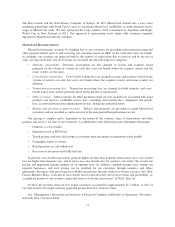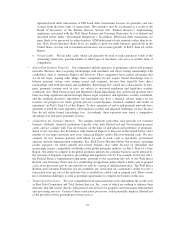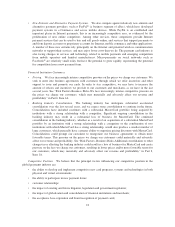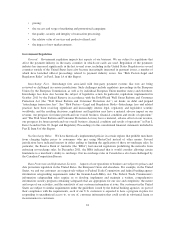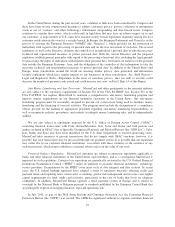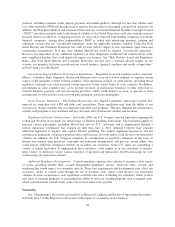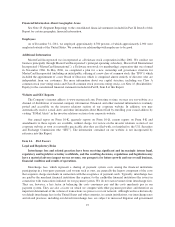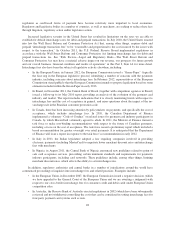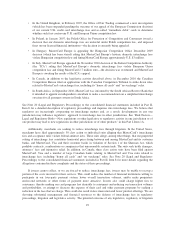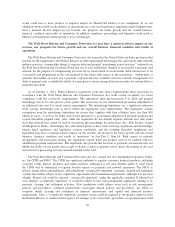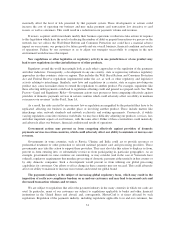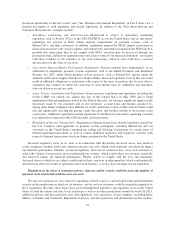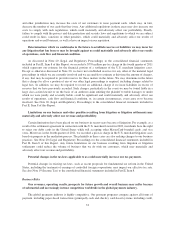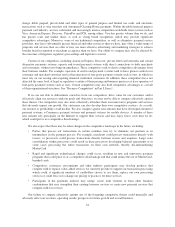MasterCard 2011 Annual Report Download - page 28
Download and view the complete annual report
Please find page 28 of the 2011 MasterCard annual report below. You can navigate through the pages in the report by either clicking on the pages listed below, or by using the keyword search tool below to find specific information within the annual report.• pricing;
• the success and scope of marketing and promotional campaigns;
• the quality, security and integrity of transaction processing;
• the relative value of services and products offered; and
• the impact of new market entrants.
Government Regulation
General. Government regulation impacts key aspects of our business. We are subject to regulations that
affect the payment industry in the many countries in which our cards are used. Regulation of the payments
industry has increased significantly in the last several years, including in the United States. Regulators in several
countries outside of the United States have also become increasingly interested in payment issues, a number of
which have launched official proceedings related to payment industry issues. See “Risk Factors-Legal and
Regulatory Risks” in Part I, Item 1A of this Report.
Interchange Fees. Interchange fees associated with four-party payment systems like ours are being
reviewed or challenged in various jurisdictions. Such challenges include regulatory proceedings in the European
Union (by the European Commission, as well as by individual European Union member states) and elsewhere.
Interchange fees have also become the subject of legislative action. In particular, regulations implemented in
October 2011 by the Federal Reserve in accordance with the Dodd-Frank Wall Street Reform and Consumer
Protection Act (the “Wall Street Reform and Consumer Protection Act”) set limits on debit and prepaid
“interchange transaction fees”. See “Risk Factors—Legal and Regulatory Risks—Interchange fees and related
practices have been receiving significant and increasingly intense legal, regulatory and legislative scrutiny
worldwide, and the resulting decisions, regulations and legislation may have a material adverse impact on our
revenue, our prospects for future growth and our overall business, financial condition and results of operations”
and “The Wall Street Reform and Consumer Protection Act may have a material, adverse effect on our revenue,
our prospects for future growth and our overall business, financial condition and results of operations” in Part I,
Item 1A and in Note 20 (Legal and Regulatory Proceedings) to the consolidated financial statements included in
Part II, Item 8 of this Report.
No-Surcharge Rules. We have historically implemented policies in certain regions that prohibit merchants
from charging higher prices to consumers who pay using MasterCard instead of other means. Several
jurisdictions have indicated interest in either ending or limiting the application of these no-surcharge rules. In
particular, the Reserve Bank of Australia (the “RBA”) had enacted regulations prohibiting the networks from
enforcing no-surcharge rules. In December 2011, the RBA indicated that it would consider allowing certain
limitations to a merchant’s ability to surcharge. Our no-surcharge rules in Canada have also been challenged by
the Canadian Competition Bureau.
Data Protection and Information Security. Aspects of our operations or business are subject to privacy and
data protection regulation in the United States, the European Union and elsewhere. For example, in the United
States, we and our customers are respectively subject to Federal Trade Commission and federal banking agency
information safeguarding requirements under the Gramm-Leach-Bliley Act. The Federal Trade Commission’s
information safeguarding rules require us to develop, implement and maintain a written, comprehensive
information security program containing safeguards that are appropriate for our size and complexity, the nature
and scope of our activities, and the sensitivity of any customer information at issue. Our customers in the United
States are subject to similar requirements under the guidelines issued by the federal banking agencies. As part of
their compliance with the requirements, each of our U.S. customers is expected to have a program in place for
responding to unauthorized access to, or use of, customer information that could result in substantial harm or
inconvenience to customers.
24





